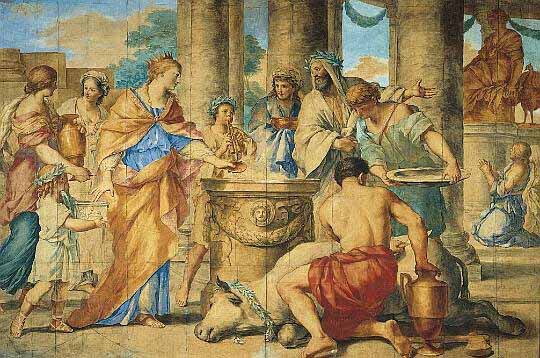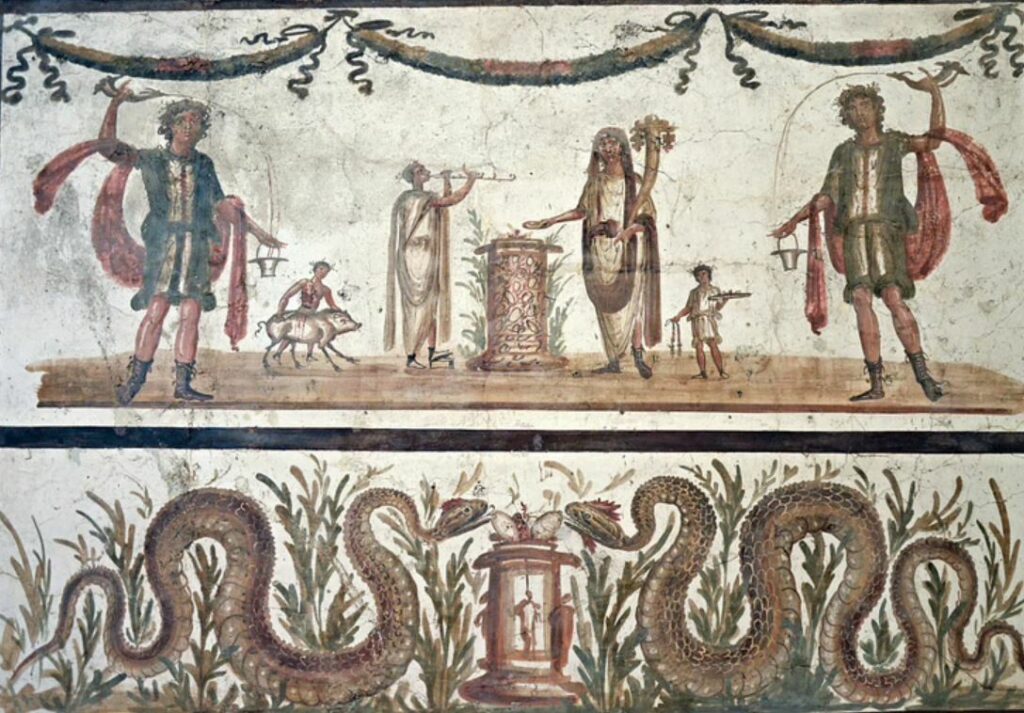by Brendan Heard, Contributing Writer, Classical Wisdom
The Roman world was a pagan society with a very strong moral code – but what can be hard for people to understand is that, while moral, that code was very different from our own. Religion was everywhere and part of everything Romans did. Religion’s role was to protect the state, the social order, and to maintain the reciprocal power-play between mortals and the gods. It was not necessarily a dualistic good/evil moral framework of absolutes. Or at least, the absolute rules for good and evil they had were not the same as ours today.
It takes imagination to achieve a distanced and appreciative understanding of life in ancient Rome. Religion in their age, in many ways, had very little to do with morality, in the sense that its purpose was not to ensure you were good or bad. Rather, it was more of a functional backdrop of the casual relations of daily life.
This is evident in the gods the Romans worshipped. In Rome, the gods were everywhere and present in all actions. The Roman gods, in particular, often had a very direct, practical ‘function’. For example: Terminus was the god of landmarks and boundaries, Cloacina was the goddess of the sewer system, and Forculus was the god of the integrity of doors, along with Cardea (goddess of hinges).
Their religion expanded through conquest, and so did its pantheon. In time, the majority of the most prominent gods in the Roman pantheon were equivalents to Greek counterpart deities. Jupiter was an equivalent of Zeus, Minerva was an equivalent of Athena, and Neptune was a counterpart of Poseidon, amongst many others. Despite this, certain gods were distinct and unique to the Romans, such as Janus (although these gods often had antecedent figures).
If you wanted success in whatever you were doing, the proper god had to be respected, as a practical matter of action. Magic and divining, respectful rituals, veneration for ancestral blood-lines, sacrifice, were all essential components of what was a richly structured and deeply strict sense of civic duty. Candles lit the faces of ancestors, continually, as they also burned for individual household gods. A Roman god wanted recognition and respect: a small part of each meal was shared with the gods, with a direct fear that negligence would lead to negative consequences in the real world.
Because Roman religion was not dualistic, there was not exactly a strict categorizing of ‘good and evil’, with one leading towards heaven and the other to hell. Despite this, they did, however, hold broadly similar conceptions of the afterlife, in the form of Tartarus, a primordial prison which held the defeated Titans, and Elysium, a blessed island that allowed a happy afterlife for heroes. Tartarus and Elysium are, however, outliers; there was little emphasis on moral duality. The flip-side to this was a more unabashedly adroit attitude towards violence, revenge, and conquest.
In fact, in many ways Roman cult activities were designed to keep blood and death at the forefront of public awareness, as was the circus maximus and the violence of gladiator battles. They felt there was great wisdom in being reminded of death, constantly. There probably is.
The Romans believed in fate (fatum) – not in a world of random occurrence, but of the unfolding of the intelligible will and order of the gods. Their world was full of sacred mystery. They believed in family and blood-lines (patrician lineage) and personal sacrifice for honour, above concepts of personal good as manifest in individual personal mercies and pities. Though they had less strictness of ‘metaphysical law’, they knew religion as a force of action in reality. Oracles and soothsayers played an important part in private and public life, even affairs of state and vital military decisions. The divine law did not hinder their human freedom of choice, but it was important for them to feel connected with the hidden (religious world) in the sense that they were fulfilling the divine plan and honouring their ancestors in their choices and actions. In that sense they did not seek religious solace (or conviction) in prayer and forgiveness, but in ‘fateful action’.
As we can see, there are many fundamental and stark differences in their attitude to religion and morality. It can be hard for us to understand, to frame our thoughts from their moral point of view when trying to make sense of their world, yet their aims and desires are often familiar and relatable.
Regardless, many people do not realize the relative nature of moral concepts they take for granted as universal, that were very different in the past.
Regardless, many people do not realize the relative nature of moral concepts they take for granted as universal, that were very different in the past.











No comments yet. You should be kind and add one!
Our apologies, you must be logged in to post a comment.